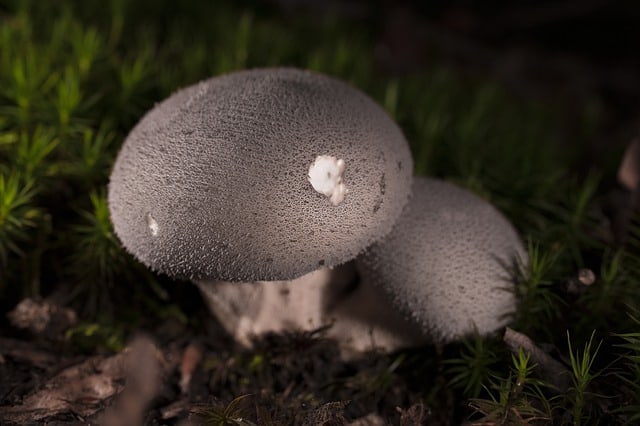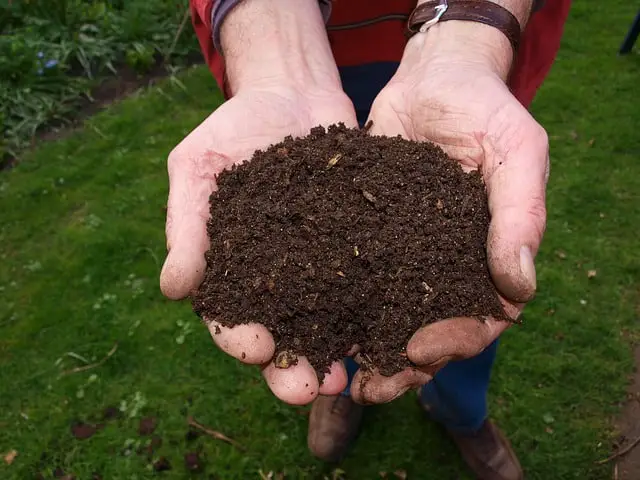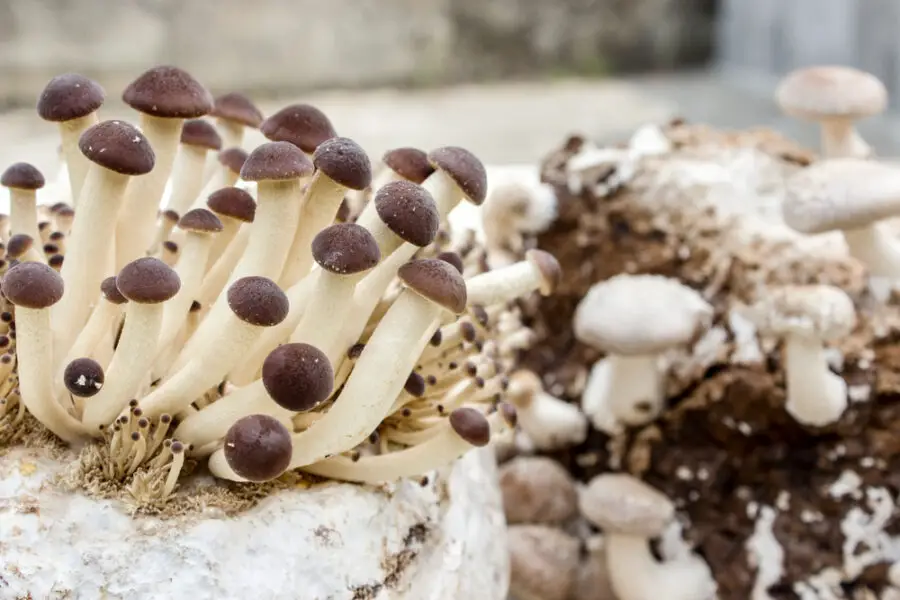Mushroom growing kits sold by reputable companies contain only the spores from edible mushroom types and are completely safe to grow and eat. Foraging for wild mushrooms is a skill that takes years to learn, and is very unsafe compared to growing mushrooms at home.
The rest of this article will go into why mushroom kits are safe, how you can feel confident that your kit will not contain poisonous mushrooms, how to tell a poisonous mushroom apart from a kit mushroom, why you shouldn’t grow psilocybin (“magic mushrooms,”) and best practices to ensure your health and safety.
Is It Safe To Grow Your Own Mushrooms?
Yes, mushroom growing kits are the safest way to provide edible mushrooms for your home kitchen. The varieties of mushrooms grown in kits are most often found in wooded areas and forests, which are far less safe because poisonous mushrooms that look similar to the safe ones live there, too!
Are Homegrown Mushrooms Safer than Store-bought?
Unlike a lot of mushrooms sold in grocery stores, most mushroom growing kits are organic and therefore, free of pesticides and other agricultural chemicals. If you want to reduce the amount of contaminants in your diet, it could be argued that kit-grown mushrooms are better for you than store-bought mushrooms.
How Does Growing Mushrooms From a Kit Compare to Foraging for Them?
While an experienced mushroom forager will know the difference between a safe mushroom and a poisonous “lookalike,” growing mushrooms from a kit is a much safer way to consume them. It can take years of observation and practice to learn safe mushroom foraging, but a kit can be safely grown in just a few weeks!
How Do I Know That the Type of Mushroom in the Kit is Safe to Eat?
Mushroom kits are inoculated with carefully cultivated spores and are quality tested to make sure no contamination has occurred. Poisonous wild mushroom varieties are only found in wild, wooded, and forested areas, too far from the sterile labs that cultivate the spores for kits.
What If My Kit was Contaminated?
The most common contamination in home grow kits is mold, which is not poisonous, but will prevent mushrooms from growing. Even this is rare since reputable companies that manufacture mushroom kits have rigorous practices and policies to prevent contamination because it costs them so much money to replace and sterilize everything.
Most poisonous mushroom varieties do not grow well outside of a wild environment, and would not grow at all in a kit. If that reassurance is not enough to inspire confidence in the safety of your kit, you can look up photos of the mushroom variety you will be growing and compare them.
Are There Poisonous Mushrooms That Look Like the Ones in My Kit?
The poisonous mushrooms that resemble kit mushrooms are all wild species, and extremely unlikely to propagate at all outside of a wild environment, even if your kit was somehow contaminated with their spores. These poisonous mushrooms typically require a cooler, darker, and more humid environment than a home kit would provide.
If you are still concerned that your mushroom kit might possibly contain a poisonous lookalike, here are some lookalikes for common mushroom varieties found in kits and how you can eliminate them as a possibility:
Oyster Mushrooms
| Type of Look-AlikeHow to Know It’s Not an Oyster MushroomJack-O-LanternBright Orange Looks like a Chanterelle Gills have weak bioluminescence (glow in the dark) when freshIvory FunnelGills run down the stemGhost FungusGlows in the dark |
Shiitake Mushrooms
| Type of Look-Alike | How to Know It’s Not a Shiitake |
| Funeral Bell | Smaller than Shiitake Brown spore print Annulus (ring around the stem) when young |
Lion’s Mane Mushrooms
There are no poisonous look-alikes for the Lion’s Mane mushroom, making it the perfect kit to start with if you are overly concerned that a poisonous mushroom miraculously infected your kit with spores.
Is the Substrate Clean?
If you bought your kit from a reputable company, you can be confident that the substrate is clean because every aspect of the kit is sterilized before shipping to eliminate the possibility of contamination. Even kits for varieties of mushrooms that thrive in manure are sterilized so that when they are shipped the bacteria and microorganisms in the substrate that can harm humans are dead.
I’m Growing Psilocybin Mushrooms… is it Safe?
Because psilocybin, or hallucinogenic “magic mushrooms,” are a controlled substance that is illegal in the United States, there are no reputable companies that sell spores or kits, and there is no way to know if the mushrooms produced would be safe to eat.
Are Spores Safe to Breathe?
No, this is the one aspect of mushroom farming that is not 100% safe. Breathing in spores from your overripe mushrooms can cause various pulmonary problems, but these illnesses and chronic conditions are never caused by short term exposure like harvesting a mushroom kit.
How Can I Reduce Spore Exposure?
Mushroom spores are released at the very end of the flush when the fruit is so mature that it may be overripe. To reduce spore exposure, err on the side of caution and harvest your mushrooms earlier, rather than later.
If you have forgotten about your kit and have some overripe mushrooms that you’d rather not let go to waste, harvesting them in a ventilated area and quickly rinsing them is a good practice. Be sure to cook the mushrooms within 24-48 hours of rinsing, as overripe mushrooms spoil more quickly.
What Happens if I was Exposed to Spores?
It’s very unlikely that you will experience any health problems if you harvested your mushroom kit too late and inhaled some spores. Remember that there are wild spores in the air we breathe every day, and the pulmonary issues that are caused by fungal spores only occur after long-term exposure.


